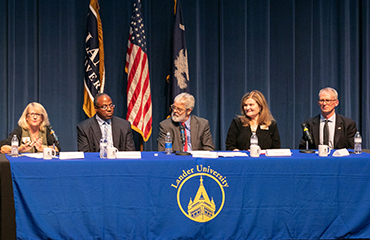
The day after voters cast their ballots in the 2018 midterm elections, Lander University hosted a panel discussion designed to spark conversations about civic engagement.
Approximately 250 students and community members attended the Wednesday, Nov. 7, event held in Lander's Abney Cultural Center Auditorium.
The event was part of Lander's "Achieving the Promise: Democracy and the Informed Citizen" series that provides events throughout the 2018-2019 academic year, building upon the university's legacy of civic engagement by giving a distinct set of opportunities and experiences for its campus community and the citizens within the Lakelands region. The forum was funded in part by S.C. Humanities, a state program of the National Endowment for the Humanities. The "Democracy and the Informed Citizen" project is spearheaded by the national Federation of State Humanities Councils, of which S.C. Humanities is a member.
"Tonight's discussion is about the broad array of ways in which we can be active as citizens," said Dr. Lucas McMillan, dean of Lander's College of Behavioral & Social Sciences. "Citizens must and should do more than just show up on election day. We can, and must work together to advocate for better communities, activities that may be a part of an established organization, or may require the establishment of a new group, network or organization."
Panelists for the forum included:
According to Dr. Ashley Woodiwiss, professor of political science and chair of Lander's Department of Government, Criminology & Sociology, the overriding theme of the forum revolved around new localism. Quoting from a book entitled "The New Localism," Dr. Woodiwiss shared the definition of the term to describe "…how civic councils - organically formed of local officials, business leaders, and neighborhood organizations - are making profound and beneficial impacts on their local communities."
Achieving the Promise
The Achieving the Promise series will continue on Tuesday, Nov. 13 with a lecture by Lander professor Dr. Kimberly Richburg, concerning "Briggs v. Elliott," the S.C. case that later inspired "Brown v. Board of Education."
SC Humanities
The mission of South Carolina Humanities is to enrich the cultural and intellectual lives of all South Carolinians. This not-for-profit organization presents and/or supports literary initiatives, lectures, exhibits, festivals, publications, oral history projects, videos and humanities-based experiences that reach more than 250,000 citizens annually. South Carolina Humanities receives funding from the National Endowment for the Humanities as well as corporate, foundation and individual donors. It is governed by a volunteer Board of Directors comprised of community leaders from throughout the state.